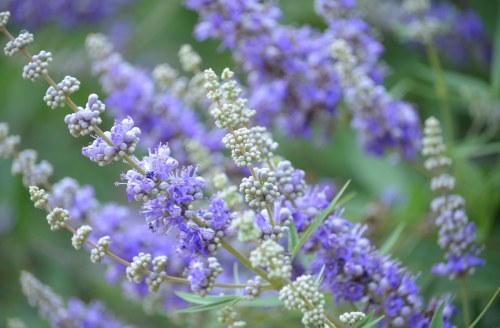Our editors independently select these products. Making a purchase through our links may earn Well+Good a commission
Meet vitex, the hormone-balancing herb you’ve probably never heard of
Got cramps? You should know about these vitex benefits for women, including reducing PMS symptoms and helping prevent migraines.

If you have crazy-terrible PMS every month (cramps, mood swings, low energy, the works!) you’ve probably tried literally everything to make it less terrible. Heating pad? Check. Magnesium supplement? Check. Dairy-free ice cream? Check. But one lesser-known PMS remedy that probably should be in your arsenal: vitex.
If you just heard a record skip at the word vitex, you’re not alone. It also goes by the name chasteberry, or the Latin name Vitex agnus castus if you’re feeling nasty. And while it might seem a bit more obscure, it’s actually been around for a long time, says Chiti Parikh, MD, co-director of the Integrative Health and Wellbeing Program at New York-Presbyterian and Weill Cornell Medicine.
“Vitex is a plant in the verbena family and commonly found in the Mediterranean region,” she says. “It’s been used for medicinal purposes for thousands of years.” Color me intrigued.
Keep reading for more intel on vitex benefits, including how it works and what to know before trying it.

In the ye old days, medieval monks reportedly took chasteberry to reduce their libido (explaining that odd name). Today however, many women believe vitex can help regulate their hormones, particularly when it comes to PMS. “Vitex is believed to reduce the amount of prolactin in the body,” says Dr. Parikh.
Why that matters: Prolactin is a hormone involved in producing milk when you’re breastfeeding, and it’s produced by your pituitary gland at the base of your brain (as well as from other places in the body). It’s also helps regulate the reproductive and immune systems. Current research suggests that vitex may work by binding to dopamine receptors to reduce the secretion of prolactin.
OK, that’s a lot of science talk. But what does the vitex-prolactin connection actually mean for you? Here are some of the potential vitex benefits:
1. It can decrease breast tenderness
If you have super sore boobs during your period, you might benefit from some vitex. “Abnormally high levels of prolactin can lead to cyclic breast tenderness,” says Dr. Parikh. (Meaning breast pain that comes and goes with your menstrual cycle.) “In Europe, Vitex is the standard treatment for [this type of] breast tenderness and has been used for decades,” she says.
2. It can make other PMS symptoms less terrible
Beyond breast discomfort, vitex may also help you feel better in the agonizing days before your period if you’re dealing with cramps, bloating, and moodiness. Some research shows that vitex improves some PMS symptoms (like back pain and anger) by 50 percent, according to a 2014 review in BMC Complementary & Alternative Medicine.
In a later 2017 review and meta-analysis published in the American Journal of Obstetrics and Gynecology, taking vitex was found to help relieve symptoms of PMS compared to a placebo in 13 out of 14 studies analyzed. However, the researchers say that this evidence isn’t conclusive, since the studies on vitex they looked at were of poor quality and potentially biased. “There is a clear need for high-quality trials of appropriate size examining the effect of standardized extracts of Vitex agnus castus in comparison to placebo, selective serotonin reuptake inhibitors, and oral contraceptives to establish relative efficacy,” the study authors wrote. So take some of these PMS-reducing benefits with a grain of salt.
3. It may prevent migraines
Many women deal with hormonal migraines around their periods. If that’s you, vitex may help prevent this debilitating head pain. A 2013 study by Italian researchers found taking 40 mg per day of Vitex for three months helped women experience fewer monthly attacks and headache days. The catch: It wasn’t a placebo-controlled study, something would be needed to confirm that this is a bona fide benefit.
4. It can help ease symptoms of hyperprolactinemia
When your body creates too much prolactin, it can lead to a condition called hyperprolactinemia. Soaring levels of prolactin can cause sandpaper-y sex via vaginal dryness, breast leakage (when not breastfeeding), irregular periods, and problems getting pregnant.
There are various causes, including having a benign tumor on the pituitary gland called a prolactinoma or an underactive thyroid. All of this requires a visit to your practitioner (those symptoms are no joke), but with a doctor’s sign-off, vitex can be used to help regulate those prolactin levels in addition to other treatment. Some case studies show vitex may decrease prolactin levels in people with hyperprolactinemia, but it doesn’t work for everyone.
Anything else people should know if they want to try vitex?
As with all herbs and supplements, the most important thing is to talk to your doctor or healthcare provider before using vitex. Hormone imbalances are serious, and can be caused by a number of conditions that your doc should rule out first before trying herbs or other home remedies.
Vitex is generally safe for most women to use, says Dr. Parikh. But there are some exceptions. People who are pregnant or breastfeeding should not try vitex, she says, since it may affect your breast milk production. Vitex should not be used by people on hormonal birth control or hormone replacement therapy or who have a hormone-sensitive cancer like breast cancer since the plant can impact your body’s hormones. It potentially has an effect on dopamine receptors, too, so experts warn that it may mess with some drugs used to treat Parkinson’s symptoms.
You can find primarily find vitex in capsule form. If you do decide to try it, don’t expect instant miracles. Dr. Parikh says it could take two to three months before seeing benefits. (So be patient!)
TL;DR: Vitex benefits have a lot of potential, but you should def see your practitioner before trying it. The plant could be a great tool in your PMS-fighting toolkit, along with OTC meds, a heating pad, and (of course) chocolate. You’ll be ready to kick cramps to the curb.
If you have back pain from PMS (the worst!) here’s how to deal with it at home. And speaking of periods…you should probably know what to do if you have a stuck tampon (also the worst).
Sign Up for Our Daily Newsletter
Get all the latest in wellness, trends, food, fitness, beauty, and more delivered right to your inbox.
Got it, you've been added to our email list.










